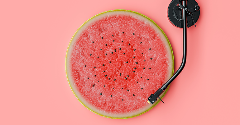News
European wine industry suffers another blow in beleaguered year
4 Sep 2020Despite demand for alcohol, including wine, surging during the pandemic, the global wine industry has been suffering as a result of trade restrictions, labor shortages, and now, weather woes. In Italy’s northern Veneto region, a violent storm at the end of August ravage 5% of the regions vineyards, causing €6 million worth of damage and a wine season to go up in smoke for many vintners, Forbes reported.
This blow to the European wine industry, within which Italy is the top producer, comes only weeks after Tuscany announced its grape harvest was at risk due to limited seasonal workers arriving, most of them from Eastern Europe to whom many borders are closed. To help combat this looming threat, Tuscany's Fedagripesca Confcooperative petitioned the Italian government for agricultural vouchers to lure students, restauranteurs and the unemployed to work short-term on the vineyards for harvest.

These strains in the European wine industry build on an already troubled outlook. In 2019, Italian wine production fell 15% compared to 2018, CNBC reported. Numbers from IWSR forecast Italian still wine volumes to drop yet another 9.54% in 2020. Sparkling wine volumes from the country are predicted to fall by 16.86%.
While it may stand to reason that the increase in at-home wine consumption will help buoy a battered industry, the numbers do not support this hopeful prediction. In the U.S. shuttered restaurants and bars previously made up the majority of American’s alcohol indulgence, and as a result of limited capacity for dining out, domestic wine sales dropped 5% to $48 billion between June 2019 and June 2020, according to data from market research firm Wines Vines Analytics. In Italy as well, over 50% of the country’s still wine consumption happens in bars which have remained shut during the country’s strict lockdown, per IWSR data reported by CNBC.
This economic crisis is not unique to the European wine industry. Production in the U.S., where California accounts for 50% of the nation’s wine industry revenue, suffered dramatically due to wildfires and labor shortages. The result is that the loss of wine revenue for the U.S. is anticipated to ring up at $5.94 billion, according to a report from the Sonoma State University School of Business and Economics. In 2019, the national wine economy generated $8.5 billion in revenue. Individual wineries are expected to lose between 36% and 66% of their revenue this year
Related news

Retail landscape lacks nutritious and affordable food, says ATNi
30 Dec 2025
A rapid increase in modern food retail has given retailers growing influence over consumer diets, according to global non-profit ATNi’s latest assessment.
Read more
Debate over ban on ‘meaty’ names for plant-based products reaches stalemate
26 Dec 2025
The debate over a ban on plant-based products using “meaty” terms has reached a stalemate, leaving manufacturers in limbo and still facing overhauls to their marketing and packaging.
Read more
Multi-sensory food and drink products to gain traction in 2026
16 Dec 2025
Trend forecasters predict that sensory elements will play a larger role, helping food and beverage brands differentiate themselves in a competitive market in 2026.
Read more
Big appetite for M&A between European and US food and drink companies
3 Dec 2025
Persistent tariffs on EU food and beverage exports have helped drive record levels of M&A activity between European and US companies this year, according to analysis by ING.
Read more
Non-UPF Program extends certification scheme to entire food industry
30 Nov 2025
The Non-UPF Program has extended its certification scheme to the wider food sector, championing a move towards healthier consumption habits.
Read more
Lancet study links UPFs to chronic disease risk
26 Nov 2025
UPFs are consistently associated with an increased risk of diet-related chronic diseases, according to a comprehensive review of global evidence in The Lancet .
Read more
Concerns swirl around cinnamon’s compliance with EU law
25 Nov 2025
Cinnamon may be a top functional ingredient, but it needs stronger protocols to ensure it meets EU food safety laws and quality standards, say researchers.
Read more
Oat Barista: Innovation for game-changing beverages
20 Nov 2025
Oat Barista is a clean label, sustainable, and innovative drink base specifically designed to create the perfect foam in one single ingredient.
Read more
How younger consumers are redefining ingredient choices and rejecting brand loyalty
18 Nov 2025
Gen Z and millennial consumers’ preferences for transparency, functionality, and purpose are “redefining the very nature of consumption itself”, says SPINS.
Read more
Hybrid formats and flexible positioning to disrupt category norms in 2026
17 Nov 2025
Trend forecasters expect food and drink to move more fluidly across occasions, functions, and formats as consumers seek versatility, novelty, and convenience.
Read more